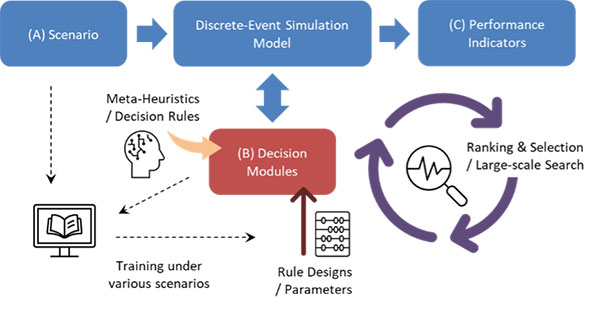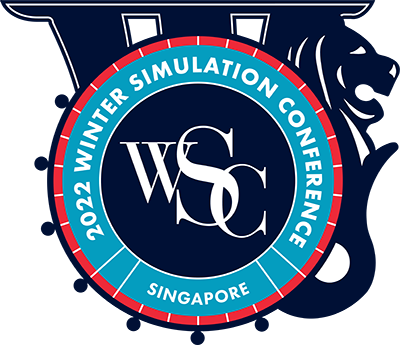In line with the spirit of “Reimagine Tomorrow”, the theme for this year’s Winter Simulation Conference (WSC), we are thrilled to introduce our Case Study Competition which will examine the role of simulation in next-generation industrial systems as well as plant the seeds of collaboration between academia and industry.
Titled “Smart Simulation for Intelligence Incubation”, the competition aims at demonstrating and promoting simulation’s ability to cooperate with optimization rules and data learning in order to improve the overall performance of intelligent systems. It will provide participants with an opportunity to explore and exploit the use of simulation tools in supporting real-time decision analysis under different scenarios.
Well-known for its efficiency in logistics services, Singapore is currently in the midst of developing the world’s largest next-generation container port. 2022 WSC examines the country’s next-generation logistics and port systems integration and how simulation can provide quality solutions in planning for the future. To further support this effort, the organizers have selected a classic case –automated grid mover system– from the maritime port and logistics industry as the main case study for the competition. We strongly encourage all who are interested in simulation to join us and try your hand at the Case Study Competition!
More information will be announced at a later date. Stay tuned and keep a lookout on this page for more updates!
For any inquiries, please feel free to drop our Case Competition Chair, Dr. Li Haobin, an email at [email protected].
This competition is supported by Huawei, which assists the competition’s execution and is responsible for the award’s disbursement to the competition winners.
Problem Description
Using the automated grid mover system as the case study for this competition, the organizers will build a basic simulation system model with discrete-event modeling methods and implement it in Python. The organizers will also provide clear documentation to describe the model structure according to the rigorously defined modeling formalism.
The organizers will specify the data and source code according to the following three aspects of information:
- Variable scenario parameters, based on which the system shall operate, such as real-time demand and resource availability, etc.
- The key decisions and default rules involved in the operation of the system, such as path planning, task assignment, etc.
- Performance indicators to measure the efficiency and quality of the system operations.

- Participants are required to:
Use Python to rewrite and replace (B) in order to maximize the performance indicators in (C) given various scenarios in (A). - Generate logic rules in (B) through various ways, including but not limited to:
- Write rule-based scripts or heuristic algorithms embedded in decision events
- Embed simulation model into external optimization search algorithm
- Use the machine learning model to identify and conclude the best rule parameters and embed them in decision events
- Provide only (B) of the program code in a dedicated folder. All other source code other than (B) will not be evaluated.
Assessment
- Once all participants have submitted their program code and data in (B), the organizers will embed them in the discrete-event simulation model prepared in advance, overwrite the corresponding original code, and compile and generate an executable simulation program.
- The pre-specified undisclosed scenarios as in (A) and random seeds will serve as the input. After which, the organizers will run the simulation program of each participant and generate the output of performance index values as in (C).
Documentation
- Case Study Competition Brief: a document that introduces the simulation system structure briefly.
- Case Study Competition Technical Document: a document that guides participants to participate the competition and provides detailed illustrations of the simulation system.
Evaluation
- This competition is split into 4 rounds. As we progress through the competition, the weightage assigned to each round increases in proportion to the scenario’s difficulty.
- The first three rounds are split over the course of three months (August-October). For each of these rounds, a new scenario is released at the beginning of every month (see schedule). Participants can submit their work for each round at any point of time before the 23rd of each month. Resubmissions are allowed only before the deadline of each round. Throughout this period, there will be a leaderboard which ranks the performance of the submissions we receive. This ranking will be regularly updated as the submissions come in, after which the final ranking for the round will be released at the end of the month.
- Unlike previous rounds, the scenario for the final round will not be released. Should they choose to, participants can submit either an updated version of their work for this round, or they can simply re-submit their previous works. Participants have up till November 23 to submit their final work for the fourth round. The leaderboard will not be public for this round.
- The participants’ performance in every round will contribute towards their overall results. Results will be announced on November 30, of which, the Top 5 finalists will be informed to prepare a report presentation for WSC2022.
Timeline
The competition officially starts on August 1 with the start of Round 1.
Round 1
Start Date: August 1
- Registration opens
- Case study is announced
- First Scenario is released
- Submissions for Round 1 open
End Date: August 23
Submissions close for the Round 1.
Evaluation Period: August 24-30
Rankings Announcement: August 31
Round 2
Start Date: September 1
- New Scenario is released
- Submissions for Round 2 open
End Date: September 23
Submissions close for the Round 2.
Evaluation Period: September 24-29
Rankings Announcement: September 30
Round 3
Start Date: October 1
- New Scenario is released
- Submissions for Round 3 open
End Date: October 23
Submissions close for the Round 3.
Evaluation Period: October 24-30
Rankings Announcement: October 31
Hidden Round
Start Date: November 1
- Submissions for Hidden Round open
- No new scenario will be released
- Participants can either:
- submit an updated version of their work OR
- re-submit their previous works
End Date: November 23
Submissions close for the Hidden Round.
Evaluation Period: November 24-29
Rankings Announcement: November 30
Top 5 teams announced.
The competition will end in December at WSC 2022 which will be in a hybrid format. At the conference:
- The Top 5 finalist teams will present their cumulative work from the competition.
- Final rankings of the Top 5 teams will be announced.
- Prizes will be awarded based on each team’s final ranking (see prize amounts).
Rules & Registration
Eligibility
To be eligible to enter the competition, all participants must:
- Register for the competition with a valid and active email address which the organizer can use to communicate with the participants.
- Either be a single entrant or part of a team of up to a maximum of five (5) members only. Each participant can only join up to one team.
- Be solely responsible for creating the competition submission. Supervision or advice from the participants’ professors or post-doctoral researchers is permissible.
The competition is open to all except for members of the committee, including all staff members. However, the committee reserves the right to approve or disapprove participation according to its own considerations.
Registration
Please click below link to complete registration and participate case study competition:
https://competition.huaweicloud.com/information/1000041743/introduction
Prizes
1st place: $3,000
2nd and 3rd places: $2,000
4th and 5th places: $1,000
6th to 10th place: 200
All amounts are in USD.
Contact
For any enquiries, please feel free to drop our Case Competition Chair, Dr. Li Haobin, an email at [email protected].
